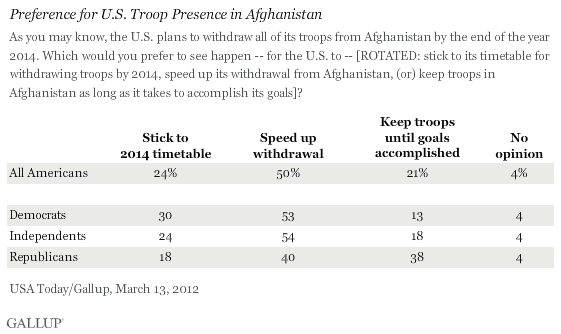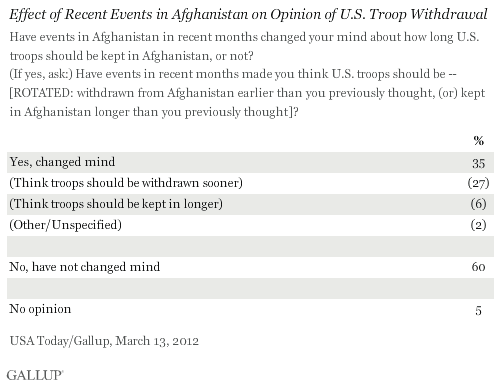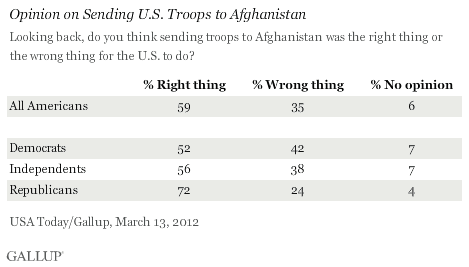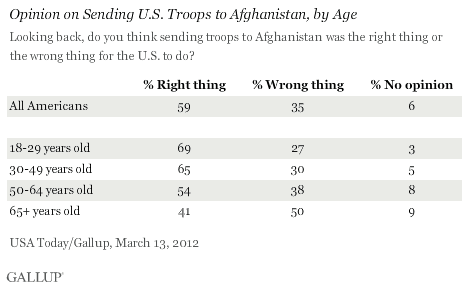PRINCETON, NJ -- Fifty percent of Americans say the United States should speed up withdrawal of its troops from Afghanistan, while 24% prefer sticking to the current timetable to leave by the end of 2014, and 21% say the U.S. should stay as long as it takes to accomplish its goals. Democrats and independents are most likely to favor a faster withdrawal than planned. Republicans are about equally divided between favoring a faster withdrawal and keeping troops in Afghanistan until the U.S. accomplishes its goals.

The results are based on a March 13 USA Today/Gallup poll, conducted a few days after a U.S. serviceman went on a shooting rampage, killing 16 Afghan civilians. This was the latest in a series of reports of troubling behavior by U.S. service members in Afghanistan, including reports of some soldiers burning Qurans and others urinating on the corpses of Taliban soldiers.
More than one in three Americans say their opinions on how long U.S. troops should remain in Afghanistan have changed because of events there in recent weeks, while 60% say their views have not changed. The vast majority of those whose opinions have changed -- equal to 27% of Americans in total -- say they now think the U.S. should withdraw sooner than they previously thought.

Americans Still Back Afghanistan Mission
Although Americans tend to believe U.S. troops should come home sooner than planned, the majority, 59%, still believes going into Afghanistan was the right thing to do. That is essentially unchanged from the 62% in a December 2009 USA Today/Gallup poll, conducted after President Obama outlined his strategy for the war.
Majorities of Democrats, independents, and Republicans say sending U.S. troops to Afghanistan was the right thing to do, with Republicans most likely to hold this view.

Americans aged 65 and older stand out as one subgroup that is much less positive about the U.S. presence in Afghanistan; with 41% saying sending troops was the right thing to do. That compares with roughly two thirds of those younger than 50.

Americans Not Highly Concerned About Potential for Terrorism
While continued U.S. involvement in Afghanistan, coupled with the recent actions of some U.S. service members, could potentially incite violence against Americans in Afghanistan and in the United States, Americans are not overly concerned about this possibility. Fifteen percent say they are "very worried" that keeping U.S. troops in Afghanistan makes the U.S. more vulnerable to terrorist attacks, with an additional 35% saying they are "somewhat worried."
Americans are slightly more worried that withdrawing U.S. troops too quickly could lead to increased terrorism by making Afghanistan a safe haven for terrorists again. Nineteen percent say they are very worried about this possibility, with another 39% somewhat worried.
Implications
Recent events involving U.S. soldiers in Afghanistan have complicated the United States' mission there, putting at risk whatever support Afghan citizens had for the U.S. presence in the country. These events have caused about one in four Americans to change their views toward favoring a speedier withdrawal from Afghanistan.
Americans still think the United States made the right decision to go into Afghanistan, and a majority has consistently supported that decision, though that support has lessened over time. Nevertheless, Americans appear to be growing impatient with the U.S. presence in Afghanistan, with half now wanting it to end sooner than President Obama's current timetable of the end of 2014.
Survey Methods
Results for this USA Today/Gallup poll are based on telephone interviews conducted March 13, 2012, on the Gallup Daily tracking survey, with a random sample of 1,006 adults, aged 18 and older, living in the continental U.S., selected using random-digit-dial sampling.
For results based on the total sample of national adults, one can say with 95% confidence that the maximum margin of sampling error is ±4 percentage points.
Interviews are conducted with respondents on landline telephones and cellular phones, with interviews conducted in Spanish for respondents who are primarily Spanish-speaking. Each sample includes a minimum quota of 400 cell phone respondents and 600 landline respondents per 1,000 national adults, with additional minimum quotas among landline respondents by region. Landline telephone numbers are chosen at random among listed telephone numbers. Cell phone numbers are selected using random-digit-dial methods. Landline respondents are chosen at random within each household on the basis of which member had the most recent birthday.
Samples are weighted by gender, age, race, Hispanic ethnicity, education, region, adults in the household, and phone status (cell phone only/landline only/both, cell phone mostly, and having an unlisted landline number). Demographic weighting targets are based on the March 2011 Current Population Survey figures for the aged 18 and older non-institutionalized population living in U.S. telephone households. All reported margins of sampling error include the computed design effects for weighting and sample design.
In addition to sampling error, question wording and practical difficulties in conducting surveys can introduce error or bias into the findings of public opinion polls.
Polls conducted entirely in one day, such as this one, are subject to additional error or bias not found in polls conducted over several days.
View methodology, full question results, and trend data.
For more details on Gallup's polling methodology, visit www.gallup.com.
